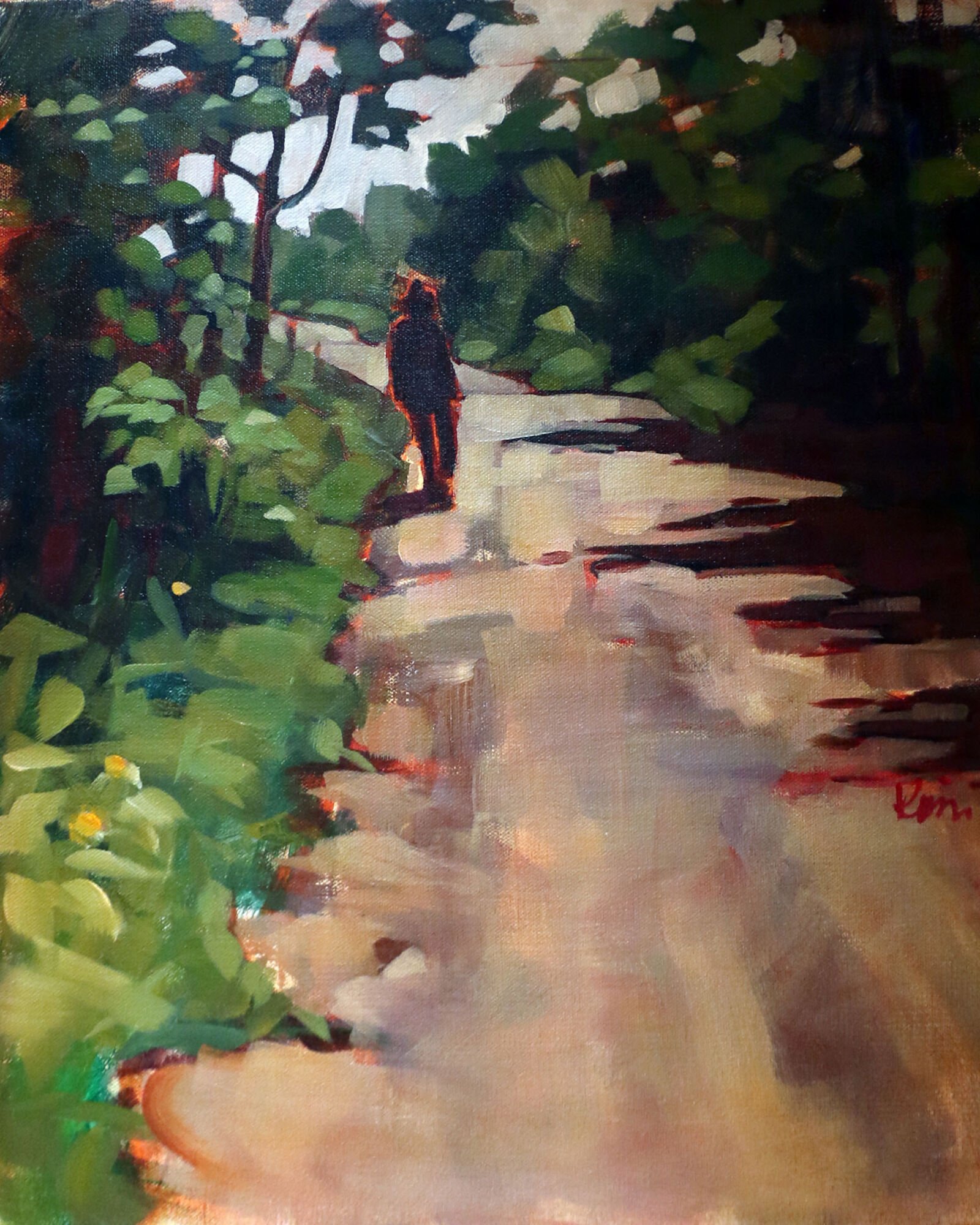
Olive Tree Hugger – Initial block in
Olive Tree Hugger – In Progress

Torching of an olive tree grove by settlers in the occupied West Bank

Mahfodah Shtayyeh (the Olive Tree Hugger) Occupied West Bank Palestine, 2005

Light Upon Light 2024 – Kathryn Kaiser
Light Upon Light
Light Upon Light | 24″ x 30″ Oil on canvas
Mahfodah Shtayyeh (the Olive Tree Hugger) Occupied West Bank Palestine, 2005
The olive tree is a symbol of Palestine and a silent victim of Israel’s war on Gaza The loss of millions of these steadfast companions has left deep scars on the hearts of many Palestinians.
In Light Upon Light I have included a depiction of a settlement in the top left as well as an allusion to the pine trees planted by Israel. The title itself was a line from a verse in Quran:
God is the Light of the heavens and the earth.
The example of His light is like a niche within which is a lamp,
The lamp is within glass, the glass as if it were a pearly (white) star,
Lit from (the oil of) a blessed olive tree,
Neither of the east nor of the west,
Whose oil would almost glow even if untouched by fire.
Light upon light.
God guides to His light whom He wills.
And God presents examples for the people,
and God is Knowing of all things.Surah 24; Verse 35
Olive Trees in Palestine
Olive trees are a symbol of steadfastness, Palestinian national identity, connection to their land, and a crucial source of income. In fact, the whole of the Levant has a similar relationship with the olive tree. Olive oil from the West Bank has become one of the most political foods in the world.
They take 15-40 years to mature, will produce olives for hundreds of years and can live for a few thousand years. Most of the olive harvest is used for olive oil production (light upon light) while the rest is used for olive soap, table olives and pickles. Olive wood is also used to produce prayer beads, and carvings that are sold to tourists in cities such as Bethlehem.
About 100,000 Palestinian families rely on olive trees as their sole source of income. Since 1967, Israeli authorities and settlers have uprooted and destroyed more than 3 million olive and fruit bearing trees. Trees are cut with chainsaws, flooded or sprayed with raw sewage, poisoned, lit on fire and bulldozed. Palestinians may be forced off their lands altogether, and/or kept from watering, harvesting or tending their groves. The average annual loss to farmers is $40 million.
Olive trees really are the centre of Palestinians’ world. They’re also ubiquitous in Palestine, with almost half of all the farmed land in the occupied territories of the West Bank and Gaza planted with olive trees. Israel is aware of the connection between Palestine and its olive trees and sees severing it as a part of its ethnic cleansing project.
Mariam Al Jaajaa (general manager The Arab Group for the Protection of Nature)
Israel has planted millions of pines and cypress as part of its ongoing attempt to erase Palestinian existence. Over the past 100 years, the Zionist and the occupation have “reforested” large parts of Palestine, claiming to “make the wilderness bloom.” This typical colonizer tactic (see North America) has turned out to be devastating on local ecologies, biodiversity and the environment. Here is an excellent article explaining this type of erasure and its effect on Palestinians and the land.
If olive trees knew the hands that planted them, their oil would become tears.
Mahmoud Darwish
If you wish to learn more about the environmental impacts of the destruction of land in Palestine, I have links on my ArtBlog Resources for Palestine here and Israel Palestine Conflict Press links here. The piece Of Olive Groves and Pine Trees – The Story of Palestine by Ayesha Malik is a heartfelt perspective from a Palestinian perspective.



Hey just wanted to give you a quick heads up.
The words in your content seem to be running off the screen in Ie.
I’m not sure if this is a formatting issue or something to do with web
browser compatibility but I thought I’d post to let you know.
The layout look great though! Hope you get the problem fixed soon. Many thanks
Thanks Viola! I am checking it now. Gah. It’s always something.
Kathryn.